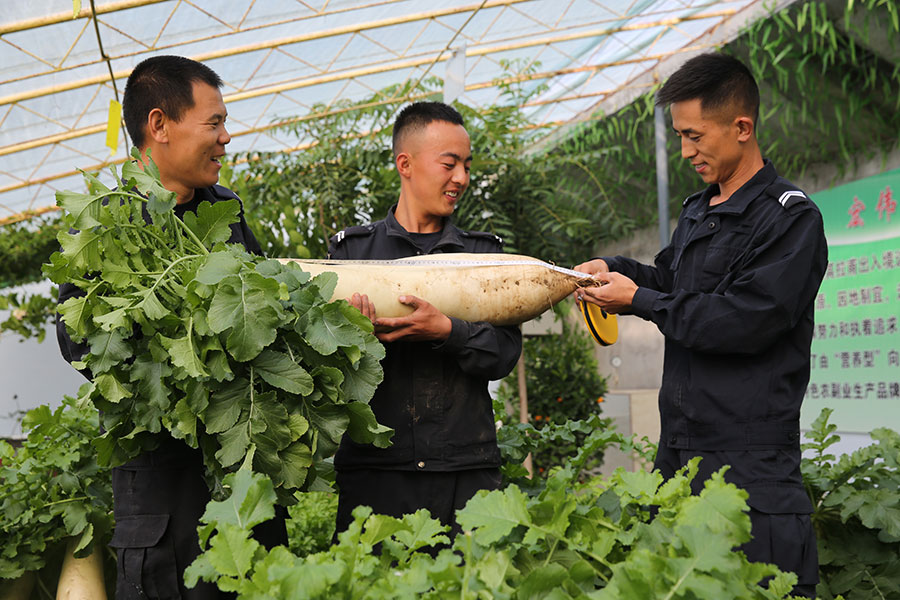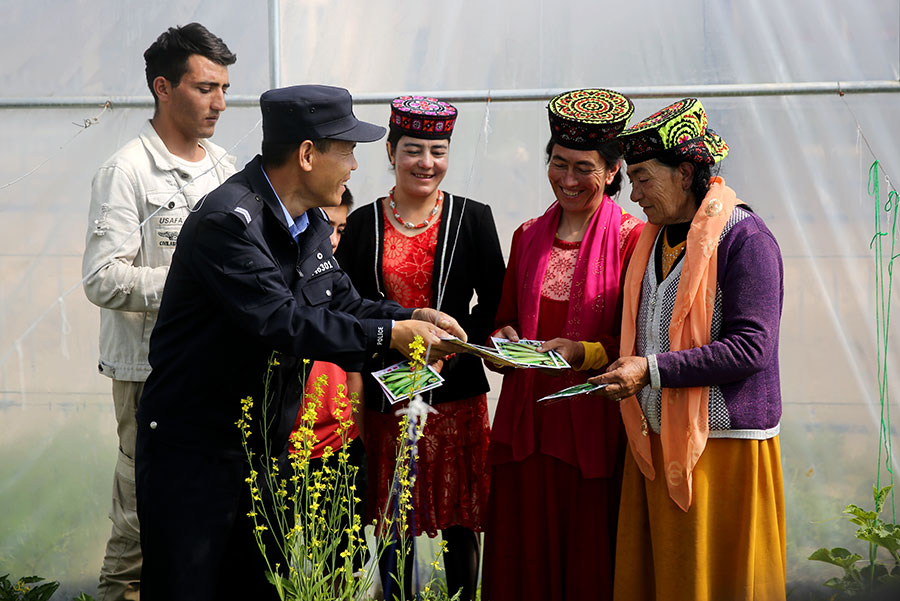
From the People's Daily App.
This is Story in the Story.
In 2018, the officers of the People's Armed Police Force were transferred from military status to the civil service.
At the border station that lies on the China-Pakistan Friendship Highway, which links northwestern China with the Gilgit-Baltistan territory of Pakistan, officers are allowed 40 days of paid leave annually, but the isolation and poor roads mean few manage to take their full allocation.
In 1968, China established a frontier inspection station in Khunjerab because of its geopolitical significance.
The oxygen deficit is a problem for tourists who can only stay a short time. However, for many recruits, it only takes them a few weeks to overcome.
Today’s Story in the Story looks at the brave men stationed along China’s northern border, and how they endure harsh conditions while living away from their families for extended periods.

Officer Sun Chao (left) and colleagues harvest white radishes in a greenhouse in Tashikurgan Tajik autonomous county, Xinjiang Uygur autonomous region, in August. (Photo: China Daily)
In 2018, Sun Chao, an immigration officer from the northern province of Hebei, made probably the hardest decision of his life.
"I have spoken with my family many times about my decision to stay at my post, and like everyone else, they were pretty confused initially. On the day I left my home, my wife reminded me that we only meet twice a year at most. I was holding my 7-year-old son tight in my arms when she said that - I had never cried before that moment," the 40-year-old said.
As the son of a farmer, born and raised in the countryside, Sun learned how to farm by continually watching and listening to the most experienced farmers. So, in his third year in Khunjerab, he requested a transfer to the station's logistics division to bring his talent into play.
In his first experiment, based on the plateau's characteristic climate, he used plastic mulch to suppress weeds and maintain temperatures. After a few days, the seedlings he'd planted broke through the soil.
However, an unexpected gale shattered his expectations. As the temperature suddenly plummeted, all the seedlings died.
"I knew that the first step was always the hardest, and once again, I deeply felt the difference between the plains and plateaus. But I knew I was not the first and only person to feel that, and that there must be a way to solve the problem," he said.
For the next few years, he was more like an agronomist than a police officer.
"I felt like a graduate student. The farmland was my university, and I found a tutor who was a plateau planting expert at the Academy of Agricultural Sciences in Kashgar. Under his guidance, I easily finished my 'dissertation,'" he said.
In 2002, Sun finally made his breakthrough as he worked out the nutrition and temperatures required to grow seeds in the station's feeding block. After the seeds sprouted, he transplanted them to a greenhouse.

Tajik herders receive seeds from Sun, who also provides advice on how to sow them. (Photo: China Daily)
Now, more than 30 kinds of vegetables are grown in Tashikurgan - including red peppers, cucumbers, carrots - and gourds, and 90 percent of the vegetables in the station's kitchen come from Sun's greenhouse.
Sun became widely known and was appointed as a planting instructor by several establishments.
Sun was happy to help the locals. To introduce and promote his planting techniques to ordinary Tajiks, he traveled from house to house and visited every greenhouse.
Now, almost every family has a government-funded greenhouse in their yard, which provides additional income. The development has fundamentally changed people's eating habits.
Sun said, "Tajiks are a traditionally nomadic people, and that shapes their free-and-easy character. It is difficult for them to stick to one place. Sometimes, they forget to water or fertilize the fields on time, but eventually, they become accustomed to the schedule.
Sun became an immigration officer when his troop was incorporated with the newly established National Immigration Administration.
During his 22 years of service, Sun has had a few chances to leave, but he has turned them all down.
"He deserves warm applause and appreciation from everyone at our station for what he did. I told him he could retire with pride, and we offered him a pension of almost 3 million yuan. But, he turned it down," said Wang Xianlei, a senior officer at the border inspection station at Khunjerab.
In addition to his memories and love of the Khunjerab Pass, Sun has invested so much time and energy in helping the locals that he is unwilling to leave.
"I only see my family once a year. It is hard to be separated from them, but I dedicated my youth to Tashikurgan and the inspection station; how could I say goodbye to all that?" he said.
(Produced by Nancy Yan Xu, Lance Crayon, Brian Lowe and Paris Yelu Xu. Music by: bensound.com. Text from China Daily and Global Times.)


